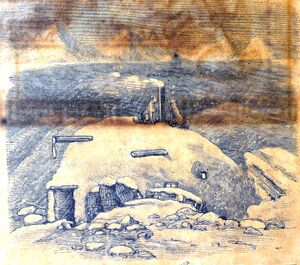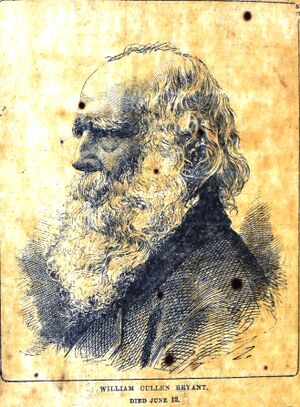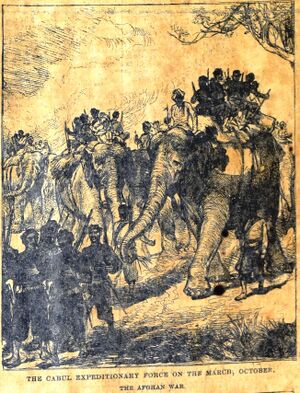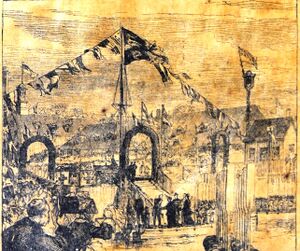 |
vol. title: Vol Four of The Theosophical Society of The Arya Samaj of Arya-wart vol. period: Sept 1878 – Sept 1879 pages in vol.: 350 |
< Untitled (continued from page 8-131) >
It seems to me that the open (not esoteric; mission of Jesus was to lead mankind to the belief in the highest ideal of the unseen Divinity— that ideal which, welled up out of His own beautiful soul, as a God of love to all men, as His children, and that the consequent feeling of the necessary brotherhood of man, and the duties arising from such brotherhood, could only be rightly manifested by material solidarity, or the abolition of all private interests in material things.
It seems to me that the merit of the life and works of Jesus consisted in this, that having seen amongst the Essenians (in whose society he probably spent many years before entering on his public teaching) the good effects of this system of solidarity, combined with the purest simplicity of life and diet, and the constant aspiration to subdue the grosser part of our nature, in order to the attainment of higher spiritual aims, he conceived the idea of generalising this beautiful system of life for the whole world, instead of its being confined, as it was in His time, to a small and exclusive sect, or brotherhood. He evidently wished to make the Essenian practices the basis of the future organisation of society; and, of course, in the then state of the world, the attempt failed and cost Him his life. If He were to attempt it now he would only be laughed at.*
Jesus was the great Freethinker and Social Reformer of that age in his part of the world.
It is but too plain, as has been proved by Lessing, the greatest critic of modern times, that almost all traces of the real teaching of Christ died out and were neglected in a comparatively short space of time after His death; and that the theologic doctrines and dogmas of Christianity, as authorised and taught by the various Christian churches, are mostly in direct opposition to the doctrines and practices of Jesus. Hence we must always carefully distinguish between the religion of Christ, which is one thing, and Christianity, which is a totally different thing.
An analogous advance from the exclusive to the more general—from esoteric truth to open truth—was made by Moses for the Israelites by his openly revealing to them as their future religion the then esoteric doctrine of the unity of the Supreme God, which he had learned from the secret teaching of the Egyptian temples. In doing this he presented to them as the object of their worship the one God Jehovah, which word is simply a literal translation of the hidden esoteric name of the Egyptian absolute God—“Nuk-pu-Nuk,” “I am that I am.”
This intellectual advance by Moses was an endeavour to extend to all the Israelitic tribes a truth which up to his time had been esoteric and confined to the Egyptian priesthood; but the altogether grander and more important advance initiated by Jesus was to extend a truer system of life and labour to all the world, not confining it to any nation, small sect, or brotherhood.
A similar movement was made in India by Cakya Muni, about 500 years before Jesus, in order to extend the advantages and privileges of his new reform to all men, instead of confining them, as was then done, to the Brahmanic caste.
I trust Dr. Wyld may be induced to give us the esoteric teaching of Jesus, as it may, perhaps, throw great light upon his open mission to men.
Lucerne, Switzerland, January 17th, 1879.
* It is curious to observe how the noble human and rational character of Jesus so soon became changed, when passed through the distorting media of theology and mythology, gradually applied to it, by the churches and the school of Alexandria; how so many characteristics of the solar and season myths, and of the Osirian and Mithraic legends, gradually came to cluster round His head, and those of the holy family, so as to accommodate the new religion in process of formation to the popular ignorance and prejudices. This unfortunate result, combined with the still more unfortunate introduction by Paul into the new growing religion of the heathen doctrine of Sacrifice, have together, in great degree, ruined the religion of Christ, however much they may have assisted in spreading abroad the superstitions of Christianity. The origin of this notion of sacrifice is very simple, and must he well known to all who have investigated the early phases of religion; in these the gods were supposed to have bodies exactly like those of human beings, and like them requiring food and stimulants (“sacrificial viands,” as the sacrifices are called in the old hymns), to give them strength to contend against the evil demons who wished to injure man. principally by keeping back min, on which their prosperity then altogether depended. This form of religion was a strict bargain and sale between men and the gods; I shall give you, gods, food and drink, praise and music, during the feast and you in return will give me rain to feed my flocks, so that there may be perpetual food for us, men, and viands on the altars for your gods. The superstitions which this doctrine brought into Christianity I need not enumerate.




Editor's notes